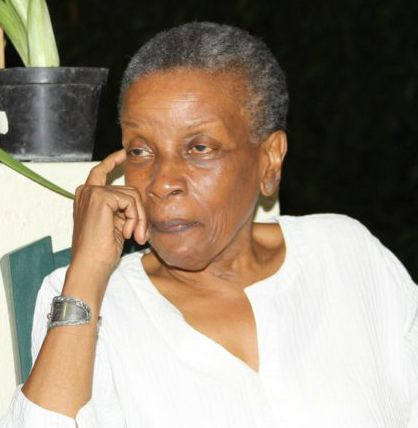 A true stalwart of human rights died on May 31. Her name was simply Andaiye. Those who have had the privilege of knowing and interacting with this daughter of the soil can attest to what a remarkable human she was.
A true stalwart of human rights died on May 31. Her name was simply Andaiye. Those who have had the privilege of knowing and interacting with this daughter of the soil can attest to what a remarkable human she was.
I have had a few fleeting interactions with the great Guyanese woman and when I read the tributes since her passing, I feel I should have taken the time to know more about her while she was still with us. Tributes have poured in from near and far and to harness the varying sentiments, those who knew and loved her have set up a special website on which all that is being said in wake of her passing is published.
“As news of Andaiye’s death spread, family, friends, colleagues, mentees, and mentors, started to send condolences/tributes to those who worked closely with her,” the creators said on the website. “Karen de Souza, Abbyssinian Carto, Alissa Trotz and Danuta Radzik decided to start this website to not only share those tributes, but to also create a public space for others to also share theirs. They envision this page evolving to share her work and continue her work. The Point Is To Change the World, is the title of Andaiye’s book that is forthcoming. Please contact da.trotz at utoronto.ca for more information.”
I felt it was only fitting that I pay tribute to that great woman in this space and below reprint with permission a tribute written by lifelong friend, sister and comrade Bonita Harris.
“On Andaiye and ‘Recognition’
“I first came to know, that is, recognise, Andaiye, then Sandra Williams, as a ‘small girl’ (9 or 10) when she was a ‘big girl’ (15 or 16) at the Bishops’ High School for girls in the late 1950s. Even then, she was ‘recognised’ as special, as noteworthy, by academic and non-academic staff, by her peers, and by us mere secondary infants; even before the authorities appointed her ‘Prefect’ and uncapped/informal ‘girl guide.’ As sometimes happened in those days, after leaving Sixth Form, she returned to teach at Bishops’ for a while. She then moved to UWI in Jamaica, and later to the Sorbonne, in France, taught in the USA, and then returned home full-time, to teach and mobilise for change in Guyana.
“If you only knew her slightly, Andaiye is still not forgettable!
“Many, including those who since have migrated from Guyana, will recognise her as the fearless, intrepid, never-daunted and caring-beyond-the-call-of-duty Headmistress, South Georgetown Secondary School (while I was a mere teacher at the time) who demonstrated against the Ministry of Education for furniture for her students, and for the relocation of the school which was frequently subject to flooding from the burial ground nearby. And this was while her friend, Shirley Field Ridley, was then Minister of Education.
“From the later 1970s onwards, she was recognised as one of the founders and leading lights of the multiracial Working People’s Alliance; as a founder and member of the leadership collective of Red Thread, and remained so with Karen de Souza, when other founding members moved into other arenas of national work; and in the Caribbean, as a highly valued gender and women’s rights resource.
“Andaiye was never not recognised. She was always actively seen, known, respected, admired, and exalted by many.
“Her formal decision, by way of deed poll in 1971, to change her two given names to one, Andaiye, was partly to exercise her right to choose how she was ‘recognised’ and to undermine the patriarchal, colonial, slavish, classist, ageist, bureaucratic, officious, and to some, offensive, tradition of recognising women by their father’s name with a ‘Miss’ or ‘Mistress’ in front. In this, she was streets ahead of women who refused their husband’s name or who added it to their birth names – oblivious to the fact that they were now carrying the last names of two men, one which they had no part in choosing, and in Guyana, for persons of African descent, usually the names of enslavers from our past.
“By choosing a Swahili name meaning ‘daughter come home,’ she gave due weight to her original African roots, her gender, and the essentially environmental commandment respected by all tribes of people from the beginning of time, popularly expressed in the Judeo-Christian culture through the instruction to ‘Honour thy father and thy mother that thy days may be long upon the land …’ (The root of the Hebrew word for honour is kabed which means to ‘attach much weight or importance to.’) Her conscious self-awareness of her origin; her acknowledgement of herself as a product of the human and physical environment that reproduced and nurtured her; her clear understanding of her reason for being in this particular place and time; her ground-breaking works in Guyana, in the Caribbean, and further afield, and her documentation of the productive and reproductive work (‘work,’ not ‘role,’ she emphasised, possibly thinking of our domestic, national, and international ‘role players’) of women, especially poor women – have never gone unrecognized by the people she worked with and for.
“Cognition is acquiring knowledge and understanding through thought, experience, and the senses – this she did, for all of her 77 years on earth. She generously imparted the knowledge she gained and struggled unceasingly with major health issues for 30-odd years, because she was so committed to ensuring that her insights and learnings would remain accessible after her passing.
“Recognition is the acknowledgment of something’s or someone’s existence, validity, or legality. While working as a teacher, activist, researcher, editor, and writer for the full recognition of the value and work of others, Andaiye recognised her own existence, validity, and legitimacy early in life and up until the end. With her decisive name change, she both legalized her existence and managed to be creatively subversive of officialdom.
“Tens of thousands (maybe hundreds of thousands) of people across class, age, ethnicity, faith, and gender; across Guyana, the Caribbean, and elsewhere, were touched and recognised by Andaiye. The outpourings and tributes, recorded and unrecorded, are proof positive that she was duly recognised. Although she graciously accepted, and did not disrespect, formal recognition conferred by governments and institutions, here and abroad, she knew that she was appreciated and valued by many without the powers that go with ‘high’ status, and remained modest, un-self-serving, available, and committed to public service, to the end.
“Wherever she found herself, children, including very small children, were drawn to her, like iron filings to a magnet. In observing her interactions with children, you could see they too felt seen, and respected, and directly recognised as full human beings, not lesser mortals.
“As an example, here is what my son, Zaman, now a husband actively parenting two daughters, had to say: (Please note his clarity on the ‘necessary and vital work that women do all around the world’ and Andaiye’s and others’ recognition ‘that it is the work that needs to be done.’ Her contact with him was indeed worthwhile. And, given the context of his tribute to Andaiye, please understand why his Aunt Denise and Yvette, two other women who helped his young life to grow up, or his father, Nigel, went unmentioned.)
“When I was living in Guyana, Andaiye told me once that if I grew to be an unworthy man that it wouldn’t be for lack of effort on behalf of her and the rest of the (remarkable) women in my mother’s group of friends. Her observation was incredibly blunt, incisive and honest. It was not malicious, but rather as a truthful assessment of the standard to which I should hold myself.
“She viewed the world as it was, without pretense, but also without cynicism and the firm belief that it could be better. She had such a generous spirit, full of kindness and compassion. Her wit was quick, dry, withering and funnier than almost anyone else I’ve ever known. She was a mentor and an inspiration to me.
“So many of these women I grew up with: Andaiye, Karen, Jocelyn, Vanda, Danuta and, of course, my Mum, built my identity as a man, as a human being. I’ve witnessed the quiet, unheralded, revolutionary work they have done throughout their lives and the effect it has had on the women, children and men they’ve worked with.
“This necessary and vital work reflected the necessary and vital work that women do all around the world, because they recognize that it is the work that needs to be done.
“I will truly miss you, Andaiye.
“Blessings, thanks and praises, and one love,
Bonita
Guyana, June 2, 2019”
We have lost a true sister of the soil, sleep on sister.
You can read more tributes on http://andaiye1942-2019.com/








